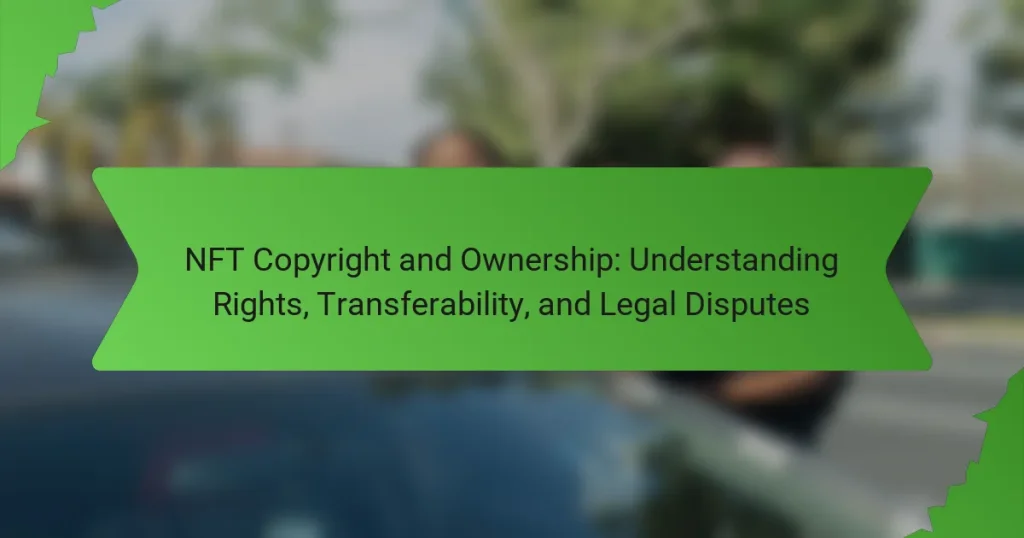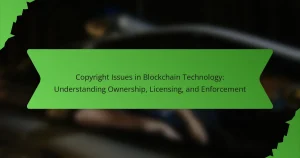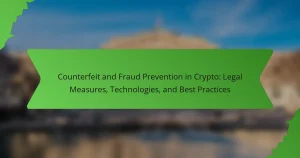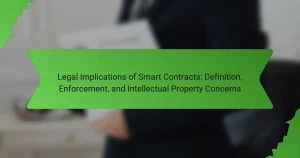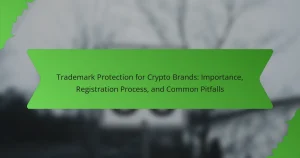NFT copyright encompasses the legal rights associated with non-fungible tokens (NFTs), including reproduction, distribution, and display of the linked digital assets. Ownership of an NFT does not automatically grant copyright ownership of the underlying work, as creators often retain these rights unless explicitly transferred. The article examines the process of NFT ownership transfer via blockchain transactions, ensuring transparency and security, and highlights common legal disputes such as copyright infringement and misrepresentation of ownership. Additionally, it addresses the complexities of copyright law in the rapidly evolving landscape of digital assets. Understanding these distinctions is essential for navigating the legal implications of NFTs.
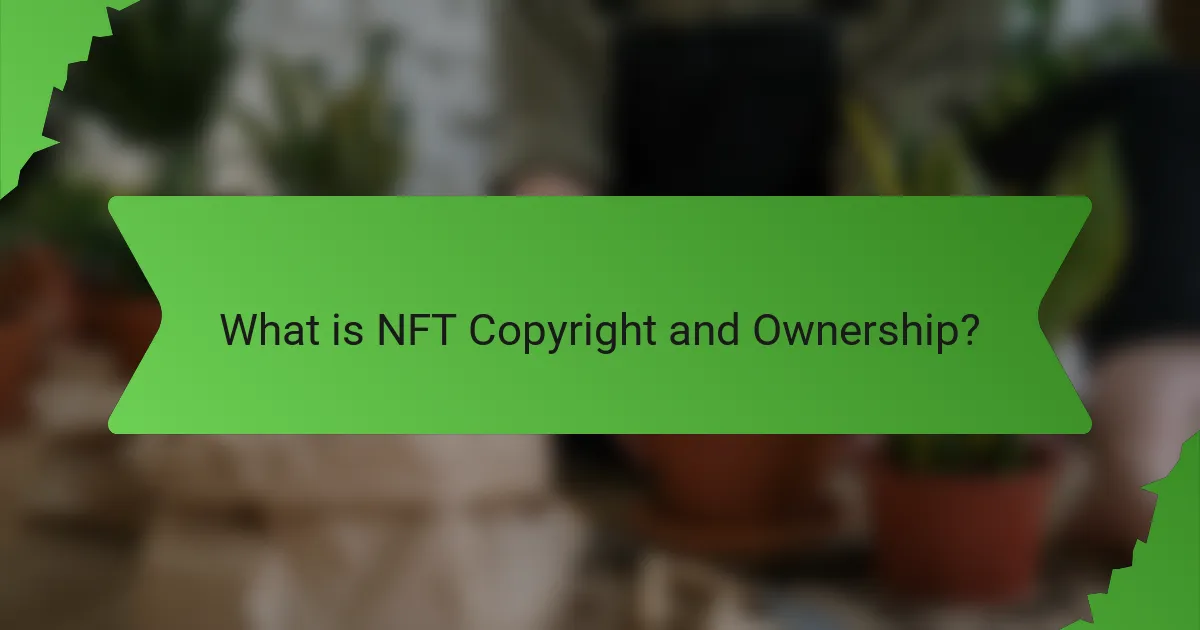
What is NFT Copyright and Ownership?
NFT copyright refers to the legal rights associated with non-fungible tokens. These rights can include the ability to reproduce, distribute, and display the digital asset linked to the NFT. Ownership of an NFT does not automatically confer copyright ownership of the underlying work. In many cases, the creator retains copyright unless explicitly transferred. This distinction is crucial in understanding the value and legal implications of NFTs. Copyright law governs these rights, providing protection to creators. Ownership of an NFT is recorded on a blockchain, ensuring transparency and security. However, ownership does not imply copyright transfer unless stated in the terms of sale.
How do NFTs relate to copyright law?
NFTs are unique digital tokens that represent ownership of a specific asset, often art or media. Copyright law governs the rights of creators over their original works. When an NFT is sold, the ownership of the token transfers, but copyright ownership may not. The creator retains copyright unless explicitly transferred. This distinction means buyers may not have the right to reproduce or distribute the work. Legal disputes can arise when buyers assume they have full rights. Courts may interpret these cases based on the terms of sale and existing copyright law. In 2021, a high-profile case highlighted these complexities when an NFT was sold without the copyright. This situation underscores the need for clarity in NFT transactions concerning copyright.
What are the fundamental rights associated with NFT ownership?
NFT ownership primarily grants the right to possess, transfer, and sell the digital asset. Owners can showcase their NFTs in various platforms or galleries. Ownership does not automatically confer copyright or intellectual property rights. The original creator retains those rights unless explicitly transferred. Owners may also have the right to resell the NFT, often benefiting from royalties on future sales. This resale right is often embedded in the smart contract. Additionally, NFT owners can utilize the asset in virtual environments, such as the metaverse. These rights can vary based on the specific terms outlined in the NFT’s metadata or associated agreements.
How does copyright apply to digital art in NFTs?
Copyright applies to digital art in NFTs by protecting the creator’s rights over their original work. When an artist creates digital art, they automatically hold copyright to that artwork. This means they have the exclusive right to reproduce, distribute, and display the art. Minting an NFT does not transfer copyright unless explicitly stated in the sale agreement. Buyers of NFTs typically acquire ownership of the token, not the underlying copyright. This distinction is crucial for understanding rights related to reproduction or commercial use. Legal disputes can arise if buyers assume they have copyright rights when they do not. Therefore, clear communication about copyright in NFT transactions is essential.
Why is understanding NFT ownership important?
Understanding NFT ownership is important because it defines the rights and privileges associated with digital assets. Ownership determines who can sell, transfer, or display the NFT. It also affects the legal implications of copyright and intellectual property. Clear ownership helps prevent disputes over authenticity and provenance. According to a report by NonFungible.com, 80% of NFTs are bought for speculative purposes, making ownership clarity essential for investors. Additionally, understanding ownership can influence the value of the NFT in the market. Therefore, knowledge of NFT ownership is crucial for both creators and collectors.
What are the implications of ownership on creators and collectors?
Ownership significantly impacts both creators and collectors in the NFT space. For creators, ownership determines the rights they retain over their digital works. This includes rights to reproduction, distribution, and display. Creators can also earn royalties from secondary sales if ownership is structured to allow it.
For collectors, ownership provides the ability to trade or sell NFTs in the market. Collectors may also gain status or prestige from owning unique digital assets. Ownership can affect the perceived value of the NFT, influencing market demand.
The legal framework surrounding ownership can lead to disputes, particularly regarding copyright and intellectual property rights. Clear ownership definitions help mitigate these disputes. Overall, ownership shapes the economic and social dynamics between creators and collectors in the NFT ecosystem.
How does ownership affect the value of NFTs?
Ownership significantly affects the value of NFTs. The ownership of an NFT establishes provenance and authenticity. Provenance refers to the history of ownership, which can enhance desirability. Authenticity ensures that the NFT is unique and not a counterfeit. High-profile ownership, such as celebrities or influential collectors, can drive up value. Market demand also fluctuates based on perceived ownership significance. Additionally, ownership rights may include access to exclusive content or experiences, adding further value. The rarity of the NFT, often tied to ownership, impacts its market price. Overall, ownership is a crucial determinant of an NFT’s market value.
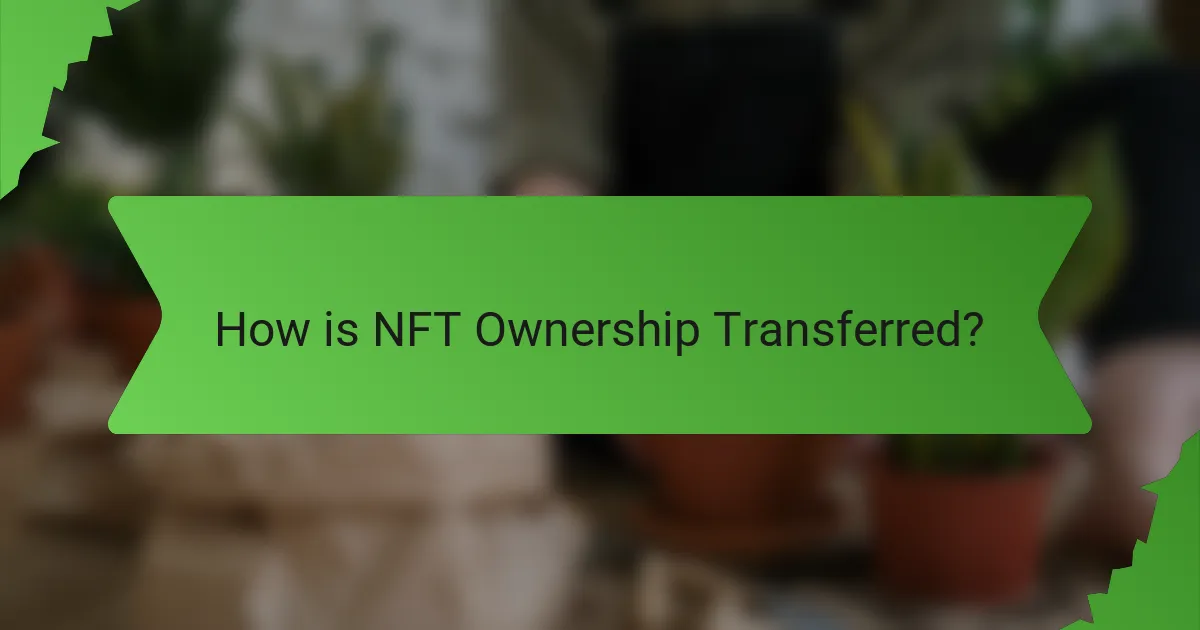
How is NFT Ownership Transferred?
NFT ownership is transferred through blockchain transactions. When an NFT is sold, the transaction is recorded on the blockchain, ensuring transparency. The seller initiates the transfer by sending the NFT to the buyer’s wallet address. The buyer then confirms the transaction, which is verified by the network. Once verified, the NFT is officially owned by the buyer. This process ensures that ownership records are immutable and publicly accessible. The use of smart contracts automates the transfer and enforces the terms of sale. Each NFT has a unique identifier, linking it to its owner on the blockchain.
What processes are involved in transferring NFT ownership?
Transferring NFT ownership involves several key processes. First, the current owner initiates the transfer through a digital wallet or platform that supports NFTs. Next, the owner selects the specific NFT to be transferred and enters the recipient’s wallet address. The owner then confirms the transaction and pays any applicable gas fees for processing on the blockchain. Once the transaction is confirmed, the NFT is recorded on the blockchain as being owned by the new recipient. This process ensures a secure and verifiable transfer of ownership. Blockchain technology provides a transparent ledger, confirming the transaction’s validity and ownership change.
How do blockchain transactions facilitate ownership transfer?
Blockchain transactions facilitate ownership transfer by recording digital asset exchanges on a decentralized ledger. This ledger is immutable and transparent, ensuring that ownership records are secure and verifiable. Each transaction is encrypted and linked to the previous one, creating a permanent history of ownership. When an asset is sold, the transaction updates the ownership record on the blockchain. This process eliminates the need for intermediaries, reducing the risk of fraud. Each digital asset, like an NFT, has a unique identifier that confirms its ownership. According to a study by Deloitte, blockchain technology enhances trust and efficiency in asset transfers.
What role do marketplaces play in NFT transfers?
Marketplaces facilitate the transfer of NFTs between buyers and sellers. They provide a platform where users can list, buy, and sell NFTs securely. Marketplaces handle the transaction process, ensuring that ownership is updated on the blockchain. They also offer features like bidding, auctions, and fixed-price sales. Additionally, marketplaces often verify the authenticity of NFTs to prevent fraud. This verification helps build trust among users. Marketplaces may charge fees for transactions, which are a source of revenue. Overall, they play a critical role in the liquidity and accessibility of the NFT market.
What are the legal considerations during NFT transfers?
Legal considerations during NFT transfers include copyright ownership, transfer of rights, and compliance with regulations. NFT creators retain copyright unless explicitly transferred. Buyers must understand the rights associated with their purchase. Contracts should clearly outline the terms of transfer. Compliance with anti-money laundering laws is crucial. Tax implications may arise from the sale of NFTs. Jurisdictional issues can complicate enforcement of rights. Each of these factors plays a significant role in the legality of NFT transactions.
How can transfer agreements protect both parties?
Transfer agreements protect both parties by clearly outlining rights and responsibilities. They specify what rights are being transferred, ensuring that both the seller and buyer understand their obligations. This clarity reduces the potential for disputes over ownership and usage. Additionally, transfer agreements often include terms related to royalties and future sales. Such provisions can benefit both parties financially. By documenting the transfer process, these agreements provide legal protection against unauthorized use. They also establish a clear chain of ownership, which is crucial in the NFT market. This legal framework enhances trust between parties, promoting smoother transactions.
What are the potential risks involved in NFT transfers?
The potential risks involved in NFT transfers include fraud, loss of ownership, and market volatility. Fraud can occur if a buyer is misled about the authenticity of an NFT. This can lead to financial loss if the buyer purchases a counterfeit or stolen asset. Loss of ownership can happen if the transfer process is not secure. Insecure transactions may result in the buyer not receiving the NFT after payment. Market volatility poses a risk as NFT values can fluctuate significantly. This can lead to potential financial losses for buyers if they sell at a lower value than purchased. Additionally, legal disputes may arise regarding copyright and ownership rights. These disputes can complicate the transfer process and lead to further financial implications.
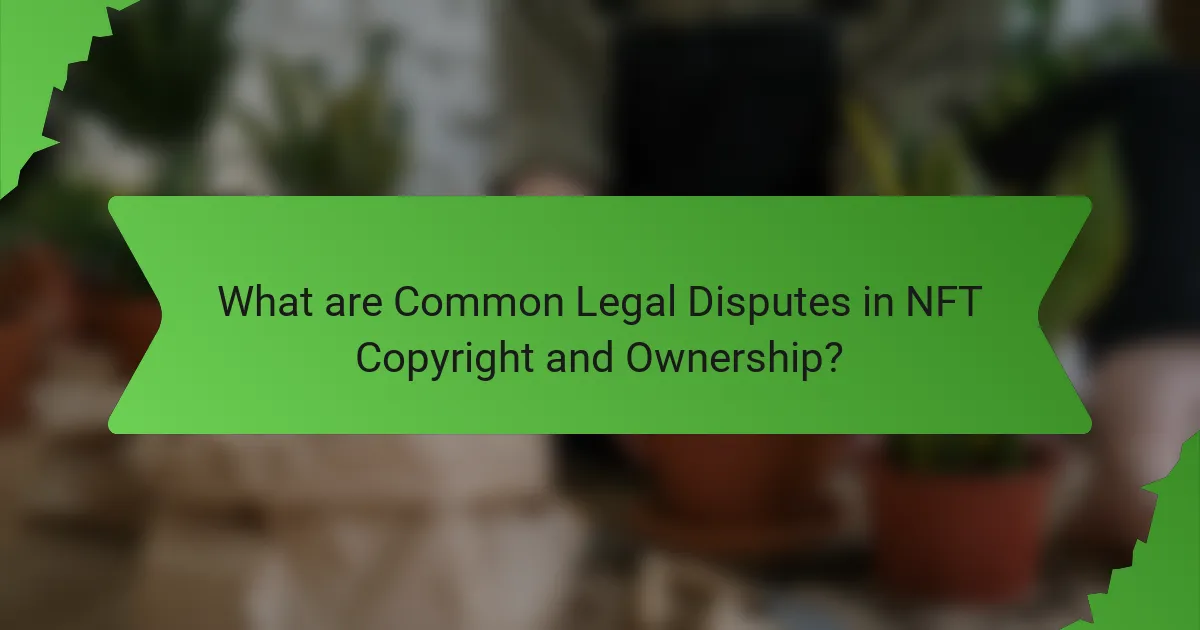
What are Common Legal Disputes in NFT Copyright and Ownership?
Common legal disputes in NFT copyright and ownership include issues of copyright infringement, misrepresentation of ownership, and unauthorized use of digital assets. Copyright infringement occurs when an NFT creator uses someone else’s work without permission. Misrepresentation of ownership happens when sellers falsely claim to own the rights to an NFT. Unauthorized use involves individuals using NFTs in ways that violate the original creator’s rights. These disputes often arise due to the complex nature of digital assets and the lack of clear regulations. Legal precedents are still being established in this rapidly evolving field.
What types of legal disputes arise in the NFT space?
Legal disputes in the NFT space primarily involve copyright infringement, ownership claims, and fraud allegations. Copyright infringement arises when creators or owners of digital art assert that their work has been tokenized without permission. Ownership claims occur when multiple parties claim rights to the same NFT, leading to confusion over rightful ownership. Fraud allegations can involve misrepresentation of NFTs, such as false claims about the rarity or authenticity of a digital asset. Additionally, disputes may arise from the failure to transfer ownership correctly, often due to technical errors or misunderstandings of blockchain protocols. These disputes reflect the complexities of digital ownership and the evolving legal landscape surrounding NFTs.
How do copyright infringements manifest in NFTs?
Copyright infringements in NFTs manifest when creators use copyrighted material without permission. This includes artwork, music, or any digital content that is protected by copyright laws. When an NFT is minted using such material, the original creator’s rights are violated. The unauthorized use can lead to legal disputes and claims of copyright infringement. Cases have arisen where artists have discovered their work sold as NFTs without consent. In 2021, the case of artist Krista Kim highlighted the issue, as her work was copied and sold as an NFT without her authorization. Such infringements undermine the original creator’s ability to control their work and receive compensation. Legal frameworks are still evolving to address these challenges effectively.
What are the common ownership disputes encountered?
Common ownership disputes in NFTs include copyright infringement, misrepresentation of ownership, and unauthorized transfers. Copyright infringement occurs when a creator’s work is used without permission. Misrepresentation of ownership arises when sellers falsely claim to own an NFT. Unauthorized transfers happen when NFTs are sold or transferred without the rightful owner’s consent. These disputes can lead to legal battles and financial losses. Legal frameworks around NFTs are still developing, adding complexity to these issues. Clear documentation and contracts can help mitigate ownership disputes in the NFT space.
How can disputes be resolved effectively?
Disputes can be resolved effectively through clear communication and negotiation. Engaging in open dialogue helps parties express their perspectives. Mediation is a useful method, allowing a neutral third party to facilitate discussions. Arbitration can serve as a binding resolution when mediation fails. Documenting agreements in writing is crucial for clarity. Understanding legal rights related to NFTs aids in resolving ownership disputes. Research indicates that structured negotiation processes lead to higher satisfaction rates among parties involved.
What legal frameworks govern NFT disputes?
Legal frameworks that govern NFT disputes include intellectual property law, contract law, and securities regulation. Intellectual property law addresses copyright issues related to the digital content associated with NFTs. Contract law is relevant when examining the terms of sale and ownership transfer agreements for NFTs. Securities regulation may apply if NFTs are deemed to represent investment contracts. Courts are increasingly interpreting these laws in the context of digital assets. Legal precedents are still developing, as NFT technology is relatively new. Various jurisdictions may have different interpretations of these frameworks. This evolving legal landscape requires ongoing analysis and adaptation.
How can parties seek mediation or arbitration in NFT conflicts?
Parties can seek mediation or arbitration in NFT conflicts by including dispute resolution clauses in their contracts. These clauses should specify the preferred method of resolution, whether mediation or arbitration. Once a conflict arises, parties can initiate the process by contacting a mediator or arbitrator. They should provide necessary details about the dispute and relevant documentation. Mediation involves a neutral third party facilitating discussions to reach a mutually agreeable solution. Arbitration, on the other hand, involves a third party making a binding decision after reviewing evidence and arguments from both sides. Many NFT platforms and legal frameworks support these processes, ensuring enforceability.
What best practices can mitigate legal issues in NFT transactions?
Implementing clear contractual agreements is essential to mitigate legal issues in NFT transactions. These agreements should outline ownership rights, usage rights, and any restrictions on the NFT. Additionally, conducting thorough due diligence on the NFT’s provenance can prevent disputes over authenticity and ownership. It is also crucial to ensure compliance with intellectual property laws. This includes verifying that the creator has the right to mint the NFT and that the buyer understands what rights are being transferred. Furthermore, maintaining accurate records of transactions can aid in resolving potential disputes. Legal counsel should be consulted to navigate complex regulations surrounding NFTs. These practices help establish clarity and reduce the risk of legal complications.
NFT copyright and ownership encompass the legal rights associated with non-fungible tokens, including reproduction, distribution, and display of the linked digital assets. Ownership of an NFT does not automatically confer copyright, as creators typically retain these rights unless explicitly transferred. The article explores the relationship between NFTs and copyright law, the fundamental rights of NFT ownership, and the implications for both creators and collectors. It also addresses the processes involved in transferring ownership, common legal disputes, and best practices to mitigate potential legal issues in NFT transactions. Understanding these aspects is crucial for navigating the complexities of NFT ownership and copyright.
